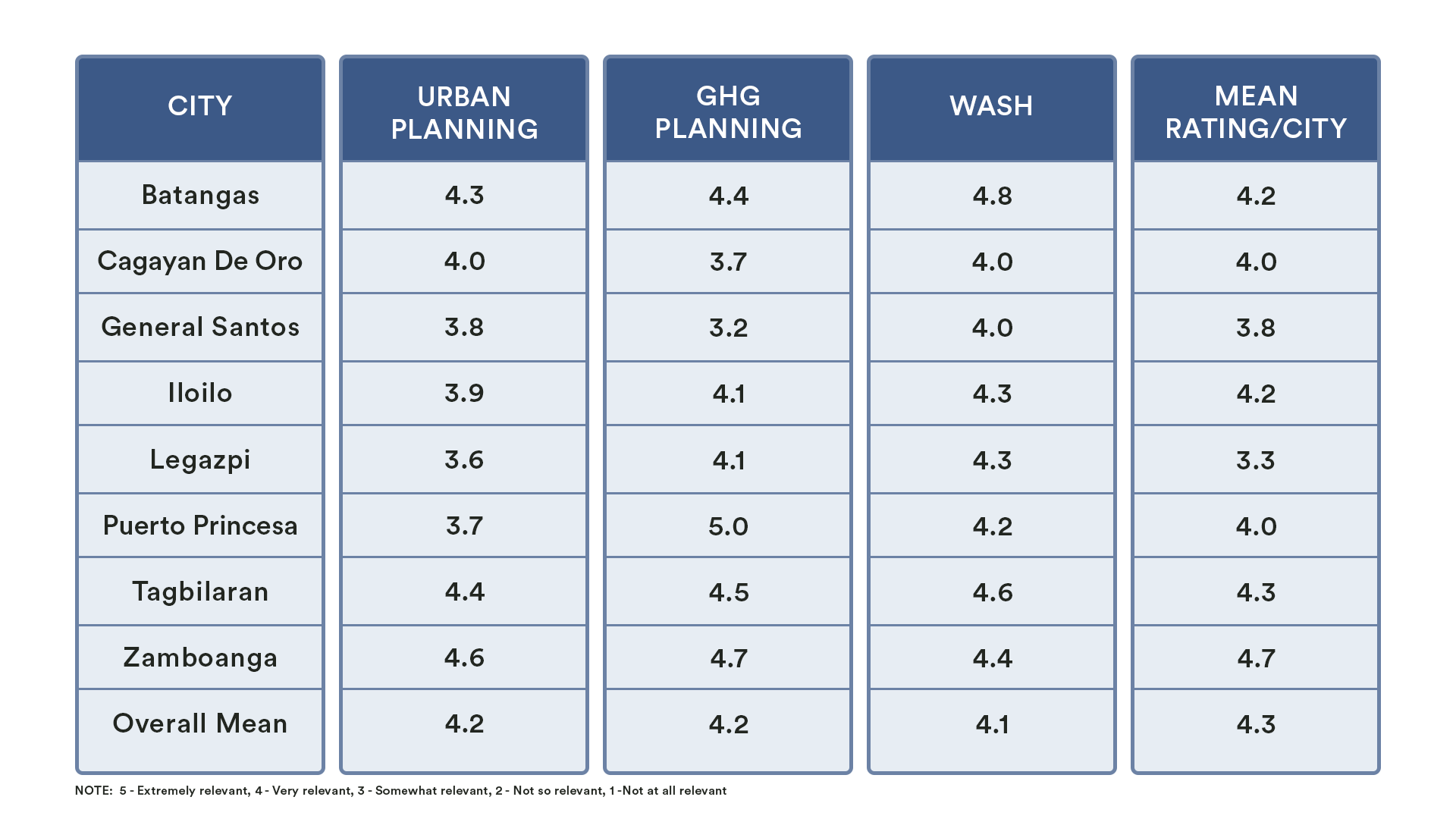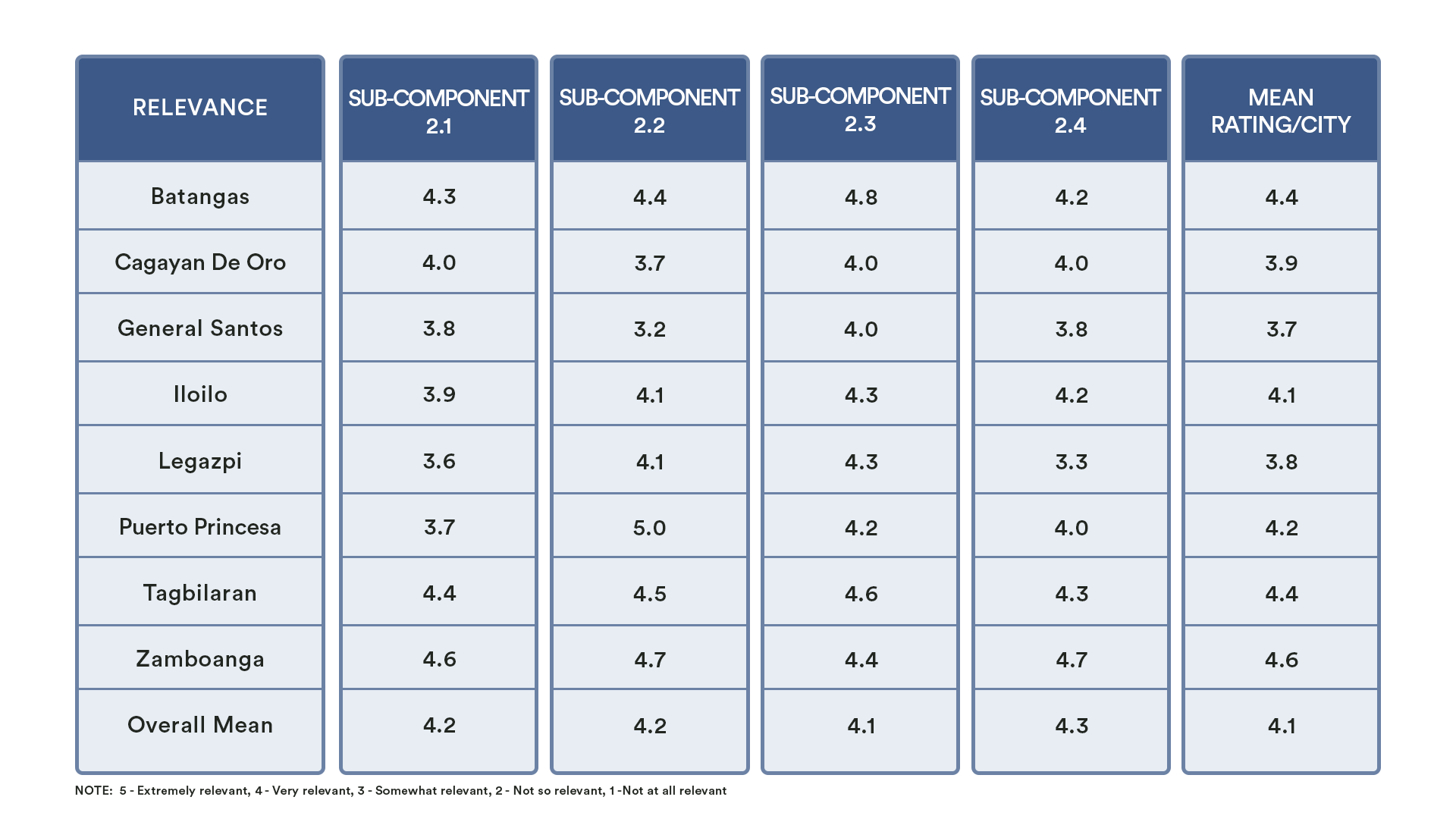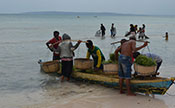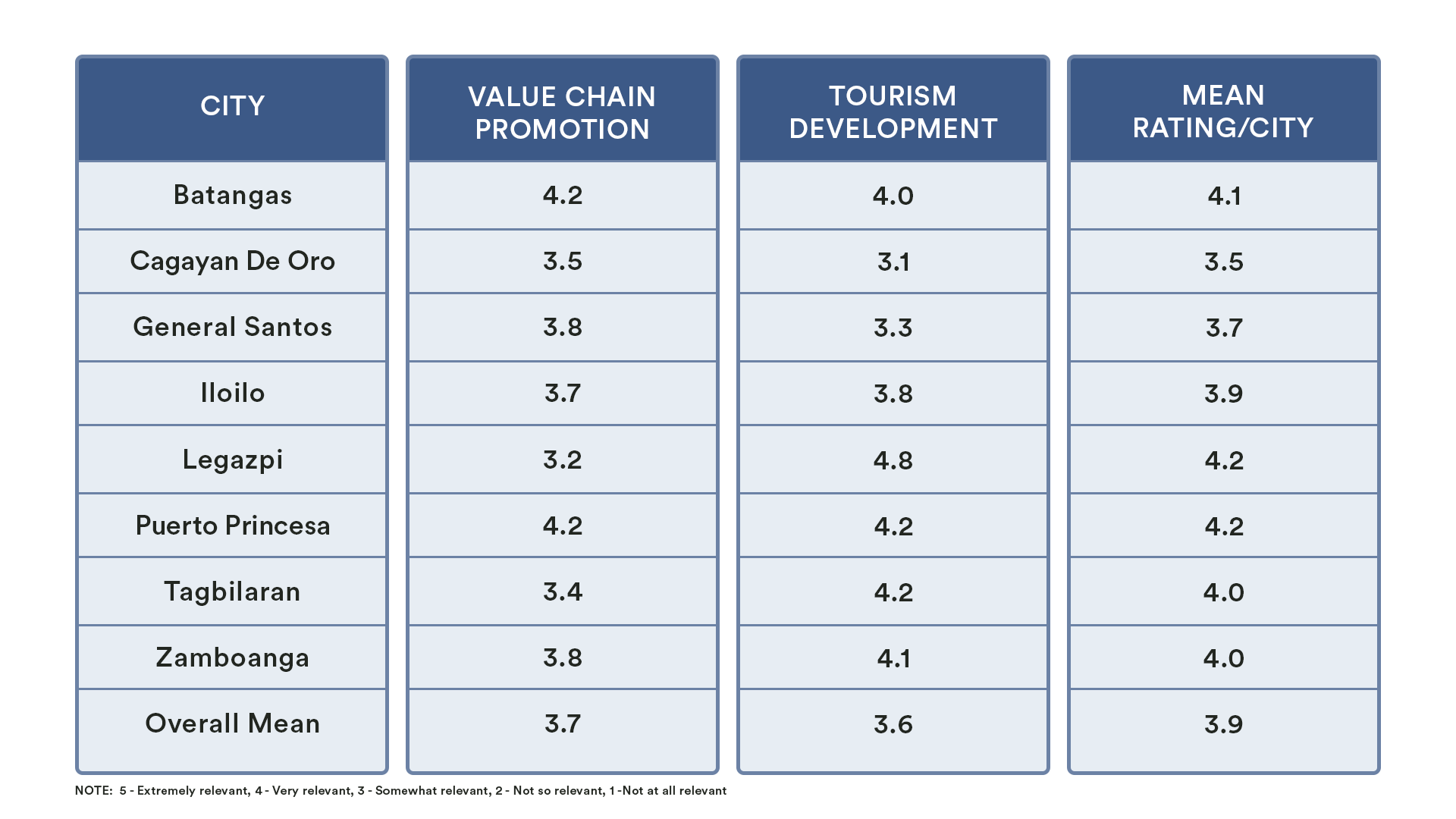Evaluation findings are presented according to the three evaluation criteria of relevance, effectiveness, and sustainability. Under each evaluation criteria, this report presents specific findings for each SURGE component and sub-component.
Relevance
To what extent has SURGE contributed to addressing the development challenges that motivated the PFG-CDI, the NSS/Philippine Development Plan (PDP, 2017-2022), CDCS (previous and current), and USAID’s policies on urban resiliency and WASH?
SURGE’s interventions to improve the institutional capacity of CDI cities for inclusive and resilient urban development contributed to USAID’s development priorities under the Cities Development Initiative-Partnership for Growth, CDCS (previous and current), and USAID’s policies on urban resilience and WASH.
Key SURGE activities under this component that directly contributed to increasing the capacity of CDI cities for inclusive and resilient economic growth include:
-
 Technical assistance in mainstreaming DRR and CCA in development planning
Technical assistance in mainstreaming DRR and CCA in development planning -
 Building institutional capacity in climate-resilient infrastructure planning and implementation
Building institutional capacity in climate-resilient infrastructure planning and implementation -
 Increasing local capacity for delivering sustainable water supply and sanitation services
Increasing local capacity for delivering sustainable water supply and sanitation services
Moreover, SURGE activities designed to enhance the urban resilience of target cities by enhancing the capacity of LGU personnel in mainstreaming CCA and DRR principles in local plans were consistent with USAID’s policy on urban resilience. SURGE’s WASH-related activities have contributed to key outcomes of the USAID water strategy, such as increasing access to sustainable water supply and improving access to sustainable sanitation.
Likewise, SURGE activities under Component 1 contributed to one of the key outcomes of the Philippine Development Plan, 2017-2022 (“individuals and communities are more resilient”).
Considering that all the target CDI cities are vulnerable to natural disasters, stakeholders viewed SURGE’s initiatives to build the capacity of cities to prepare climate-resilient and risk-sensitive local plans as highly relevant to increasing the resilience of residents, especially in disaster-prone communities:



- Note: 5-Extremely relevant, 4-Very relevant, 3-Somewhat relevant, 2-Not so relevant, 1-Not at all relevant
- View Full Image
The evaluation revealed that SURGE’s assistance was consistent with the PDP 2017-2022 as well as USAID’s directive to improve the competitiveness of second-tier cities. It directly contributed to the Mission’s DO1, Broad-Based and Inclusive Growth Accelerated and Sustained, as well as Intermediate Result (IR) 1.1, Economic Competitiveness Enhanced. The project was able to make headway on Sub IR 1.1.1 policy and regulatory framework improved and 1.1.4 fiscal performance and transparency increased, which contributed to the cities’ improved City and Municipal Competitiveness Index (CMCI) ranking.
To achieve Sub-IR 1.1.1, the SURGE activity assisted the eight CDI cities in crafting, reviewing, finalizing, and advocating for laws, policies, and procedures that support good governance as well as promoting gender and social inclusion. The legislation and its implementing rules and regulations institutionalize changes geared toward helping the CDI cities become competitive. The activity strengthened the capacities of three original cities (Batangas, Cagayan de Oro, and Iloilo) and guided the efforts of five extension cities (General Santos, Legazpi, Puerto Princesa, Tagbilaran, and Zamboanga) to comply with the mandates of the Anti-Red Tape Act 2007 as well as the Ease of Doing Business (EODB) Act 2018. By the end of the activity, all eight CDI cities had complied with the Department of the Interior and Local Government (DILG)-Department of Trade and Industry (DTI)-Department of Information and Communications Technology (DICT) Joint Memorandum Circular (JMC) 1, s. 2016 and DILG-Department of Public Works and Highways (DPWH)-DICT-DTI JMC 1, s. 2018. Compliance with business permitting and licensing system standards and national directives are two indicators of the government efficiency pillar of the CMCI.
To achieve Sub IR 1.1.4, SURGE introduced capacity-building activities that helped the CDI cities to develop their Strategic Asset Management Plan (SAMP) and Strategic Financial Management Plan (SFMP). As a pre-requisite to developing these plans, cities had to institute their Unified Land Information System (ULIS) and strengthen their Local Economic Investments Promotion Office (LEIPO).
Stakeholders who participated in SURGE’s various activities confirmed that they were very relevant to their jobs and enabled them to accomplish assigned activities that led to their city achieving an improved CMCI rank. The responses are captured in Table 2.

- Note: 5-Extremely relevant, 4-Very relevant, 3-Somewhat relevant, 2-Not so relevant, 1-Not at all relevant
- View Full Image
Regarding the relevance of activities under Component 3, SURGE activities that sought to expand economic connectivity and access between urban and rural areas were expected to contribute to: 1) CDCS development objectives (DOs), namely: broad-based and inclusive growth accelerated and sustained (DO1 – CDCS 2013-2018) and more responsive local governance (DO1 – CDCS 2019-2024); and 2) the PDP 2017-2022 goal of more inclusive growth.
Specific activities that SURGE and its LGU stakeholders view as contributing to balanced, inclusive, and mutually supportive urban-rural development include:
-
 Reviewing and simplifying city regulations to reduce barriers to productive urban-rural linkages
Reviewing and simplifying city regulations to reduce barriers to productive urban-rural linkages -
 Facilitating the introduction of all-cargo air services and new flight services to General Santos
Facilitating the introduction of all-cargo air services and new flight services to General Santos -
 Assisting in the preparation of tourism development plans for three CDI cities
Assisting in the preparation of tourism development plans for three CDI cities -
 Establishing market linkages between local producers and major markets for seaweed farmers in Puerto Princesa and cassava growers in Zamboanga
Establishing market linkages between local producers and major markets for seaweed farmers in Puerto Princesa and cassava growers in Zamboanga
Findings from the Stakeholder Survey (Table 3) reveal that SURGE activities were responsive to the stakeholders’ need for capacity strengthening in the delivery of their mandated services such as agri-fishery value chain development and tourism promotion, among others.

- Note: 5-Extremely relevant, 4-Very relevant, 3-Somewhat relevant, 2-Not so relevant, 1-Not at all relevant
- View Full Image
SURGE’s initiative to develop inter-LGU cooperation to improve coordination and exchanges between Tagbilaran City and its two neighboring municipalities by establishing the Panglao-Dauis-Tagbilaran Executive Council (PADTEC) was expected to contribute to the objectives of promoting regional agglomeration and strengthening urban-rural linkages under the NSS of the Government of the Philippines. However, the SURGE contribution to NSS objectives remains to be seen, as the concerned parties have not yet implemented with their full support some key measures to ensure the long-term sustainability of PADTEC. These measures include the designation of PADTEC staff, capacity building for the PADTEC secretariat and technical working committees, and the formulation of implementing rules and regulations through an ordinance, among others.

The U.S. Government (USG) launched the Women’s Global Development and Prosperity (W-GDP) Initiative in February 2019 to economically empower women by focusing on three pillars: women prospering in the workforce, women succeeding as entrepreneurs, and women enabled in the economy. The W-GDP Initiative coincided with efforts of the Philippine government to empower more women. In 1989, the Philippines released Executive Order (EO) 348, approving the adoption of the “Philippine Development Plan for Women for 1989-1992.” In 2009, the Magna Carta of Women was approved, followed by PCW-DILG-DBM-NEDA JMC, as amended in 2016, to localize the implementation of the act. The Philippine Women’s Commission created the Magna Carta to ensure that women are empowered and are treated equally.
The Department of Trade and Industry (DTI), through its Bureau of Small and Medium Enterprise Development (BSMED), is supporting women entrepreneurs who dominate the micro, small, and medium enterprises (MSME) sector. The DTI reported that 64 percent of MSMEs helped through their Negosyo centers are women.
The SURGE program design integrated gender in all activities. In SURGE’s initial work plan, a separate section detailed gender mainstreaming activities. Subsequently, SURGE added a gender-related output indicator to monitor its gender efforts. Output indicator 4.2.1 (later identified as 4.1) focused on the number of laws, policies, or procedures that were drafted, proposed, or adopted to promote gender equality at the regional, national, and local levels.
The W-GDP focus fits well into SURGE’s gender mainstreaming efforts. The Year 5 (October 2019 – September 2020) work plan incorporated both gender activities and output indicators. The first set of gender activities under this work plan was baseline assessments and FGDs in the CDI cities coupled with secondary research on the state of women entrepreneurs in the Philippines.
As evidenced by testimonials of women beneficiaries as well as the results of the evaluation survey, SURGE’s gender-related activities were seen as helpful and timely. The webinars, mentoring, and coaching sessions conducted virtually during the nearly two-year COVID-19-related lockdown and movement restrictions period enlightened women entrepreneurs and encouraged them to innovate within their businesses.